高中英语人教版(新课程标准)必修1 Unit 2 English around the world7(31张PPT)
文档属性
| 名称 | 高中英语人教版(新课程标准)必修1 Unit 2 English around the world7(31张PPT) |
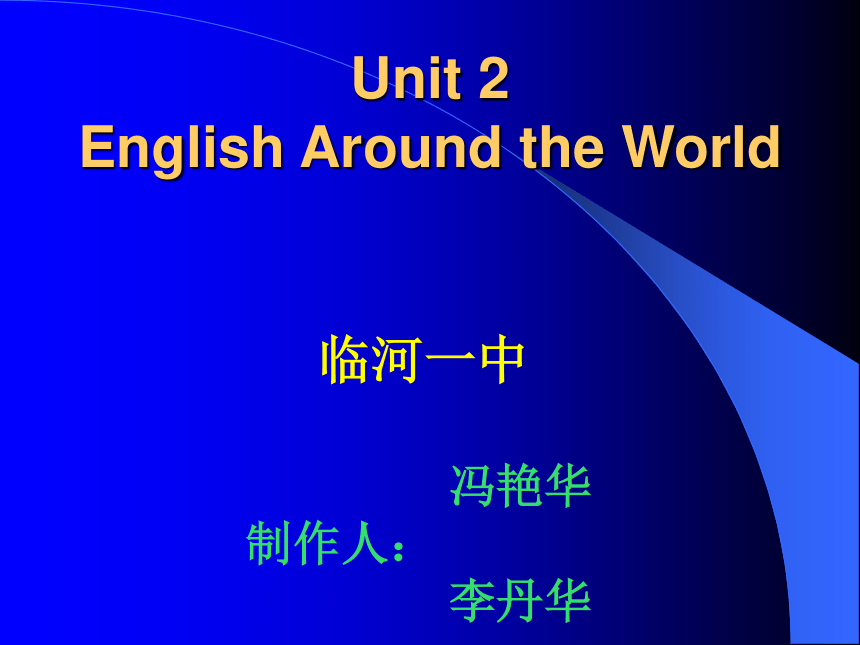
|
|
| 格式 | zip | ||
| 文件大小 | 572.1KB | ||
| 资源类型 | 教案 | ||
| 版本资源 | 人教版(新课程标准) | ||
| 科目 | 英语 | ||
| 更新时间 | 2018-01-01 00:00:00 | ||
图片预览


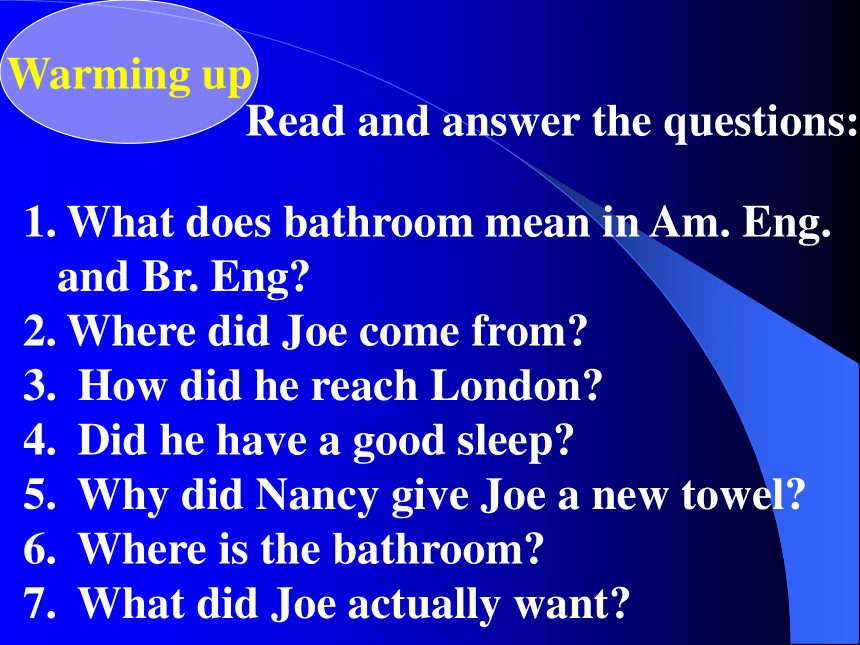
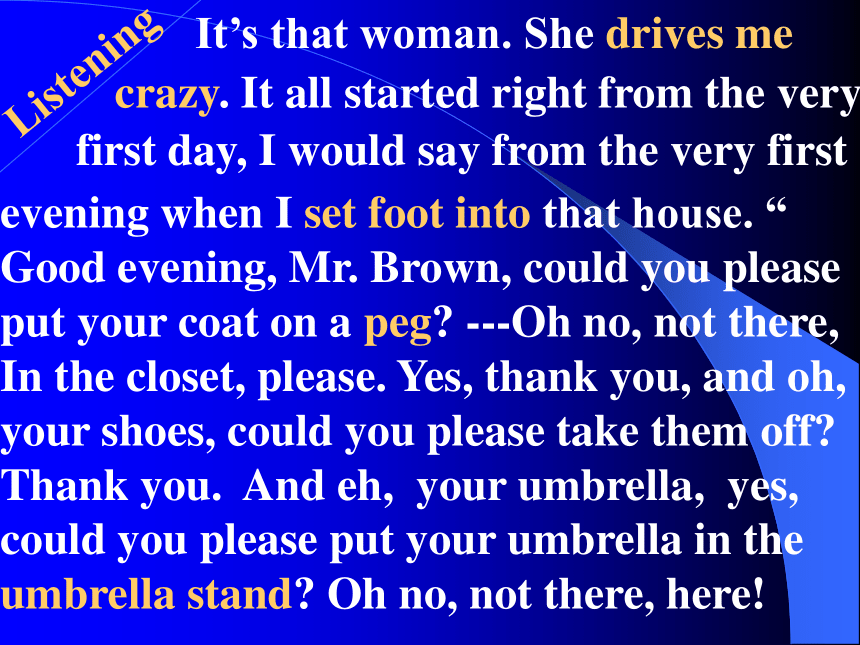



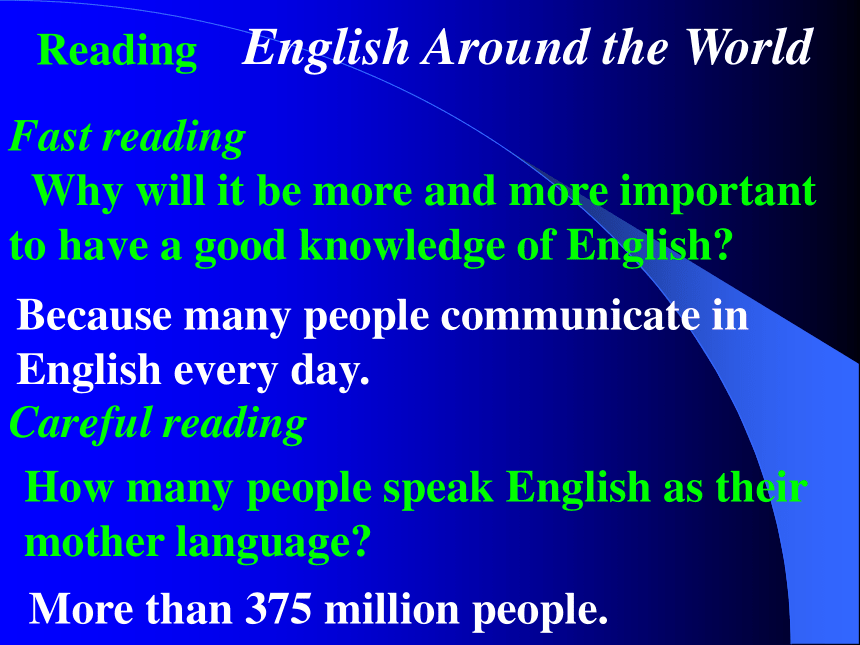

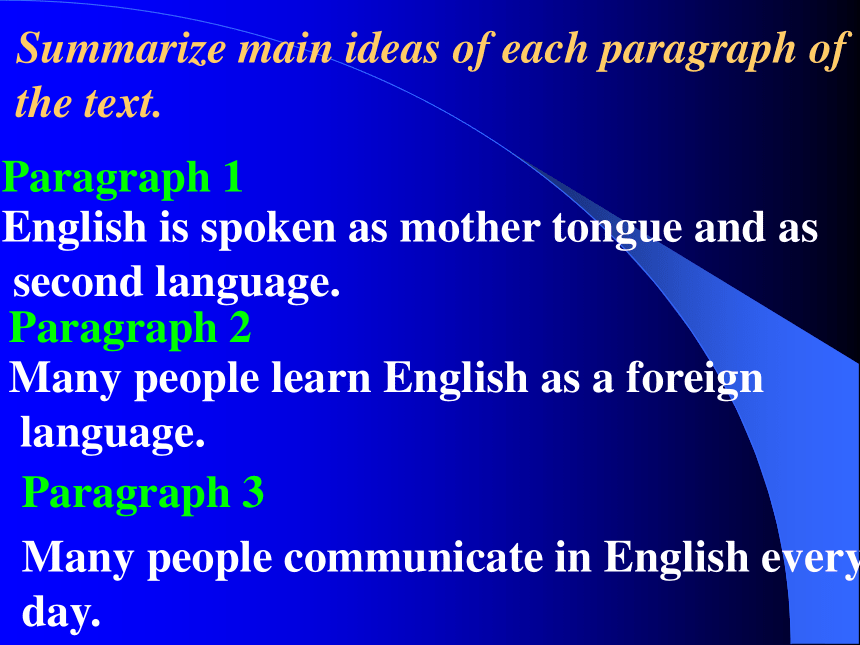
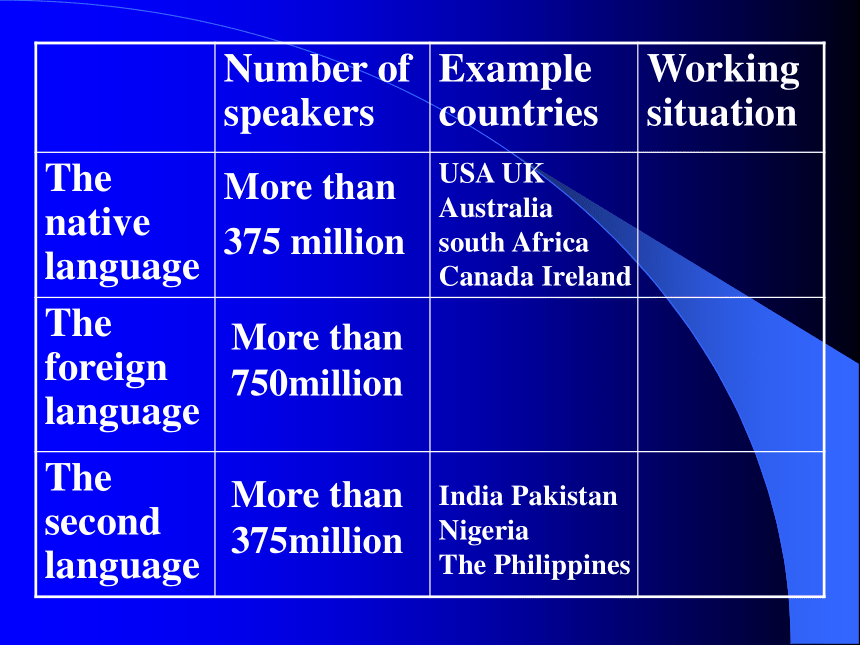
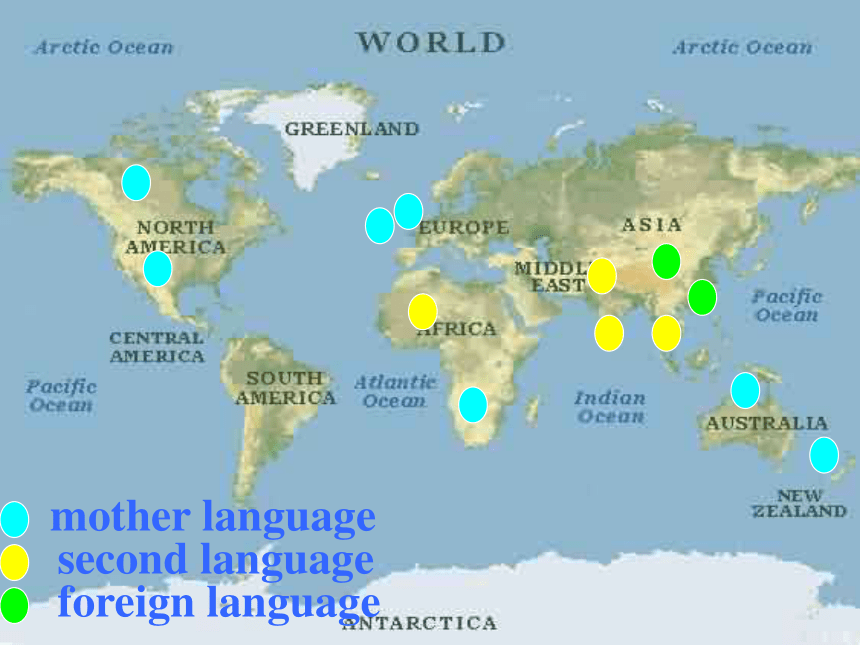
文档简介
课件31张PPT。Unit 2
English Around the World临河一中 冯艳华
制作人:
李丹华Warming upRead and answer the questions:What does bathroom mean in Am. Eng.
and Br. Eng?
Where did Joe come from?
How did he reach London?
Did he have a good sleep?
Why did Nancy give Joe a new towel?
Where is the bathroom?
What did Joe actually want?ListeningIt’s that woman. She drives me crazy. It all started right from the very first day, I would say from the very first evening when I set foot into that house. “
Good evening, Mr. Brown, could you please
put your coat on a peg? ---Oh no, not there,
In the closet, please. Yes, thank you, and oh,
your shoes, could you please take them off? Thank you. And eh, your umbrella, yes,
could you please put your umbrella in the
umbrella stand? Oh no, not there, here!Please don’t forget . The key of the front
door , here you are, and remember, if you
come home after midnight, please lock the
door. Good night! Oh Mr. Brown, would
you please be quiet after nine o’clock in the
evening?
And that was only the beginning. “Mr.
Brown, don’t shower after nine,”she shout-
ed. She would walk past my door and say,
“Mr. Brown, would you please remember not to smoke in the bathroom? Could you
walk the dog, please? Will you turn down
your radio,please? Please, Mr. Brown, could
you speak quietly on the phone ?” it was
terrible. Oh, I could not have stayed there
another week, for sure. And then there was
this letter. “Dear Mr. Brown,” it said, “
Could you please return the key of the front
door? And one more question. Can you help
me find new tenant for my flat?”Reading English Around the WorldFast reading
Why will it be more and more important
to have a good knowledge of English?Because many people communicate in
English every day.Careful readingHow many people speak English as their
mother language?More than 375 million people.List all the countries where English is their
mother tongue.the United Kingdom, the United States of
America, Canada, Australia, South Africa,
Ireland and New Zealand.List all the countries where English is spo-
ken as the second language.India, Pakistan, Nigeria and the Philippines.How is English used in China?In China students learn English at school as
a foreign language, except for those in Hong
Kong, where many people speak English as
a first or a second language.Summarize main ideas of each paragraph of the text.Paragraph 1English is spoken as mother tongue and as
second language.Paragraph 2Many people learn English as a foreign
language.Paragraph 3Many people communicate in English every
day.More than
375 millionUSA UK Australia
south Africa Canada IrelandMore than 750millionMore than 375millionIndia Pakistan
Nigeria
The Philippinesmother languagesecond languageforeign language英语与美语的差异Language points:
English is a language spoken all around the
world.定语all around the world=all over the world
throughout the world2. total
1) n. 总数 in total 加起来,总计e.g. In total, there must be around 1,000
attending the meeting today.2) adj. 整个的,全部的,总数的e.g. What is the total costs of the furniture we
need?3) vt. 总数为,加起来是 e.g. The money left totals only $15. How can
we get back home?3. equal
1)adj. 相等的,同等的,平等的e.g. Divide the food into 21 equal dishes.***be equal to 和…相等,相当于2) n. 同等或平等的人或物e.g. Women should be equals of men. 3) vt. 等于, 和…相等e.g. No one else in the restaurant equals his
service.4) of their own 他们自己的(=their own)e.g. Please use the room of your own.
=Please use your own room.4. except 除去,除掉(指在整体中除去行为
未发生者。)e.g. Everybody went to visit the library
except Jeffery because he was absent that day.except for 除了有…之外,指在一个整体中除
去其中某个或某些因素.(前后名词性质不同)e.g. I like your apartment except for the
decoration.except that 除去,除掉,后接从句.
另except when/what/where5. happen/occur/come about/take place/
break out : vi (一般不用被动形式.)6. have difficulty (in) doing sth.
have trouble (in) doing sth.
be busy doing sth have difficulty with sth.
have trouble with sth.
be busy with sth. help sb do/to do sth
help sb with sth
Grammar直接引语:直接引述别人的原话,
放在引号内间接引语:用自己的话转述别人的话。
一般构成宾语从句,不用引号。I、直接引语是陈述句时,改为间接引语时,
连接词要用that(一般可省)。注意以下变
化:1)人称的相应变化
e.g. He said, “You didn’t tell me about it”
--He said that I hadn’t told him about it.
2) 时态,指示代词,时间状语,和地点状语的相应变化. (附表)过去完成时现在进行时—过去进行时
一般将来时—过去将来时
can-could may-might
must-had toe.g. 1)He said, “I like it very much.”--He said that he liked it very much. 2)He said to me, “I’ve left my book in
your room.” --He told me that he had left his book in
my room.3)He said, “ I came to help you.”--he said that he had come to help me. 4)he said, “ I had finished my homework
before supper.” --He said that he had finished his home-
work before supper.直接引语变间接引语时态“五不变”:
(1)直接引语为客观真理He said, “the earth moves around the sun.”--he said that the earth moves around the
sun. (2) 直接引语中有明确表示过去时间的状
语,在变为间接引语时,一般过去时不变He said, “I was born in 1990 in Beijing.--He said that he was born in 1990 in Beijing.(3) 主句的谓语是一般现在时He says, “Tom is good at Chinese.”--He says that Tom is good at Chinese.(4)直接引语有以since/when引导的表示过
去时间的状语从句,在变为间接引语时,状
语从句中的一般过去时不变,但主句的谓语
动词则要改为过去完成时。 He said, “I’ve worked here since I finished school.” He said that she had worked there since
She finished school.(5) 在含有时间状语从句的直接引语中,主
句的谓语的动词为过去进行时,过去完成
时或过去将来时,在变化时这些时态不变。He said, “I was watching TV when she came
In.”--he said that he was watching TV when she
Came in.**当直接引语表示的是名人名言或谚语时,
从句时态不变。
He said, “where there is a will, there is a
way.”--he said where there is a will, there is a way.II.直接引语如为疑问句,改为间接引语时,须
将疑问句的语序变为陈述句的语序.
直接引语如为一般疑问句,变为间接引语
时,须用连接词whether/if将其引出,使其成为
间接引语的宾语从句。如果主句中的谓语动
词为said,则将其改asked.如果谓语动词后没
有间接宾语,可以加上一个间接宾语me,him,
her,us等. e.g.
She said , “Is your father at home?”
She asked me if my father was at home. 如果直接引语为特殊疑问句,仍用特殊疑
问句中的疑问词作为连接词将其引出,构成
间接引语中的宾语从名,但须将疑问式的动
词改为陈述式.
“What do you do every Sunday morning?”
my friend asked me.My friend asked me what I did every Sunday
morning.III. 直接引语为祈使句,变为间接引语时和上
面的情况有所不同,而是要用tell/ask/order
sb. to do sth. 这个句型,就是把祈使句中的动
词原形改为动词不定式.如果该祈使句的动词
为said,就将其改为told/asked/ordered等.如果
祈使句中有please一词,改为间接引语时,应去
掉please.
The old woman said to me, “Please lock the
door for me.”The old woman asked me to lock the door for
her.Exercises:
1. “I saw a note on my desk.” she said. She said that she had seen a note on her desk.2. “I’ll go to your farm tomorrow.” he said
to her.He told her that he would go to her farm the
next day.3. He said, “Are you ready?” She asked us if we were ready.4. “What do you want?”he asked me. He asked me what I wanted.5. She said to Tom, “How are you feeling
now?”She asked Tom how he was feeling then.6. “Wait for me, please,” the girl said to her
mother. The girl asked her mother to wait for her.7. He told Dr Bethune not to go on operating
any more.He said to Dr Bethune, “Don’t go on operating any more.8. Yu Ming asked who had taken her mirror.“Who has taken my mirror?” Yu Ming said.9. She asked Tom where he lived.She said, “ Where do you live, Tom?”10. He said that his sister had been there
three days before but she was not there then.He said, “ My sister was here three days ago,
but she is not here now.
制作人:
李丹华Warming upRead and answer the questions:What does bathroom mean in Am. Eng.
and Br. Eng?
Where did Joe come from?
How did he reach London?
Did he have a good sleep?
Why did Nancy give Joe a new towel?
Where is the bathroom?
What did Joe actually want?ListeningIt’s that woman. She drives me crazy. It all started right from the very first day, I would say from the very first evening when I set foot into that house. “
Good evening, Mr. Brown, could you please
put your coat on a peg? ---Oh no, not there,
In the closet, please. Yes, thank you, and oh,
your shoes, could you please take them off? Thank you. And eh, your umbrella, yes,
could you please put your umbrella in the
umbrella stand? Oh no, not there, here!Please don’t forget . The key of the front
door , here you are, and remember, if you
come home after midnight, please lock the
door. Good night! Oh Mr. Brown, would
you please be quiet after nine o’clock in the
evening?
And that was only the beginning. “Mr.
Brown, don’t shower after nine,”she shout-
ed. She would walk past my door and say,
“Mr. Brown, would you please remember not to smoke in the bathroom? Could you
walk the dog, please? Will you turn down
your radio,please? Please, Mr. Brown, could
you speak quietly on the phone ?” it was
terrible. Oh, I could not have stayed there
another week, for sure. And then there was
this letter. “Dear Mr. Brown,” it said, “
Could you please return the key of the front
door? And one more question. Can you help
me find new tenant for my flat?”Reading English Around the WorldFast reading
Why will it be more and more important
to have a good knowledge of English?Because many people communicate in
English every day.Careful readingHow many people speak English as their
mother language?More than 375 million people.List all the countries where English is their
mother tongue.the United Kingdom, the United States of
America, Canada, Australia, South Africa,
Ireland and New Zealand.List all the countries where English is spo-
ken as the second language.India, Pakistan, Nigeria and the Philippines.How is English used in China?In China students learn English at school as
a foreign language, except for those in Hong
Kong, where many people speak English as
a first or a second language.Summarize main ideas of each paragraph of the text.Paragraph 1English is spoken as mother tongue and as
second language.Paragraph 2Many people learn English as a foreign
language.Paragraph 3Many people communicate in English every
day.More than
375 millionUSA UK Australia
south Africa Canada IrelandMore than 750millionMore than 375millionIndia Pakistan
Nigeria
The Philippinesmother languagesecond languageforeign language英语与美语的差异Language points:
English is a language spoken all around the
world.定语all around the world=all over the world
throughout the world2. total
1) n. 总数 in total 加起来,总计e.g. In total, there must be around 1,000
attending the meeting today.2) adj. 整个的,全部的,总数的e.g. What is the total costs of the furniture we
need?3) vt. 总数为,加起来是 e.g. The money left totals only $15. How can
we get back home?3. equal
1)adj. 相等的,同等的,平等的e.g. Divide the food into 21 equal dishes.***be equal to 和…相等,相当于2) n. 同等或平等的人或物e.g. Women should be equals of men. 3) vt. 等于, 和…相等e.g. No one else in the restaurant equals his
service.4) of their own 他们自己的(=their own)e.g. Please use the room of your own.
=Please use your own room.4. except 除去,除掉(指在整体中除去行为
未发生者。)e.g. Everybody went to visit the library
except Jeffery because he was absent that day.except for 除了有…之外,指在一个整体中除
去其中某个或某些因素.(前后名词性质不同)e.g. I like your apartment except for the
decoration.except that 除去,除掉,后接从句.
另except when/what/where5. happen/occur/come about/take place/
break out : vi (一般不用被动形式.)6. have difficulty (in) doing sth.
have trouble (in) doing sth.
be busy doing sth have difficulty with sth.
have trouble with sth.
be busy with sth. help sb do/to do sth
help sb with sth
Grammar直接引语:直接引述别人的原话,
放在引号内间接引语:用自己的话转述别人的话。
一般构成宾语从句,不用引号。I、直接引语是陈述句时,改为间接引语时,
连接词要用that(一般可省)。注意以下变
化:1)人称的相应变化
e.g. He said, “You didn’t tell me about it”
--He said that I hadn’t told him about it.
2) 时态,指示代词,时间状语,和地点状语的相应变化. (附表)过去完成时现在进行时—过去进行时
一般将来时—过去将来时
can-could may-might
must-had toe.g. 1)He said, “I like it very much.”--He said that he liked it very much. 2)He said to me, “I’ve left my book in
your room.” --He told me that he had left his book in
my room.3)He said, “ I came to help you.”--he said that he had come to help me. 4)he said, “ I had finished my homework
before supper.” --He said that he had finished his home-
work before supper.直接引语变间接引语时态“五不变”:
(1)直接引语为客观真理He said, “the earth moves around the sun.”--he said that the earth moves around the
sun. (2) 直接引语中有明确表示过去时间的状
语,在变为间接引语时,一般过去时不变He said, “I was born in 1990 in Beijing.--He said that he was born in 1990 in Beijing.(3) 主句的谓语是一般现在时He says, “Tom is good at Chinese.”--He says that Tom is good at Chinese.(4)直接引语有以since/when引导的表示过
去时间的状语从句,在变为间接引语时,状
语从句中的一般过去时不变,但主句的谓语
动词则要改为过去完成时。 He said, “I’ve worked here since I finished school.” He said that she had worked there since
She finished school.(5) 在含有时间状语从句的直接引语中,主
句的谓语的动词为过去进行时,过去完成
时或过去将来时,在变化时这些时态不变。He said, “I was watching TV when she came
In.”--he said that he was watching TV when she
Came in.**当直接引语表示的是名人名言或谚语时,
从句时态不变。
He said, “where there is a will, there is a
way.”--he said where there is a will, there is a way.II.直接引语如为疑问句,改为间接引语时,须
将疑问句的语序变为陈述句的语序.
直接引语如为一般疑问句,变为间接引语
时,须用连接词whether/if将其引出,使其成为
间接引语的宾语从句。如果主句中的谓语动
词为said,则将其改asked.如果谓语动词后没
有间接宾语,可以加上一个间接宾语me,him,
her,us等. e.g.
She said , “Is your father at home?”
She asked me if my father was at home. 如果直接引语为特殊疑问句,仍用特殊疑
问句中的疑问词作为连接词将其引出,构成
间接引语中的宾语从名,但须将疑问式的动
词改为陈述式.
“What do you do every Sunday morning?”
my friend asked me.My friend asked me what I did every Sunday
morning.III. 直接引语为祈使句,变为间接引语时和上
面的情况有所不同,而是要用tell/ask/order
sb. to do sth. 这个句型,就是把祈使句中的动
词原形改为动词不定式.如果该祈使句的动词
为said,就将其改为told/asked/ordered等.如果
祈使句中有please一词,改为间接引语时,应去
掉please.
The old woman said to me, “Please lock the
door for me.”The old woman asked me to lock the door for
her.Exercises:
1. “I saw a note on my desk.” she said. She said that she had seen a note on her desk.2. “I’ll go to your farm tomorrow.” he said
to her.He told her that he would go to her farm the
next day.3. He said, “Are you ready?” She asked us if we were ready.4. “What do you want?”he asked me. He asked me what I wanted.5. She said to Tom, “How are you feeling
now?”She asked Tom how he was feeling then.6. “Wait for me, please,” the girl said to her
mother. The girl asked her mother to wait for her.7. He told Dr Bethune not to go on operating
any more.He said to Dr Bethune, “Don’t go on operating any more.8. Yu Ming asked who had taken her mirror.“Who has taken my mirror?” Yu Ming said.9. She asked Tom where he lived.She said, “ Where do you live, Tom?”10. He said that his sister had been there
three days before but she was not there then.He said, “ My sister was here three days ago,
but she is not here now.
